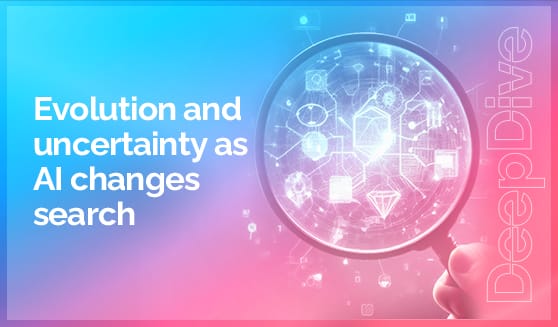
Evolution and uncertainty as AI changes search

Welcome to the 100 new deep divers who joined us since last Wednesday. If you haven’t already, subscribe and join our community in receiving weekly AI insights, updates, and interviews with industry experts straight to your feed.
DeepDive
Your weekly immersion in AI.
AI search tools have become part of daily life for many of us. But just as we’re integrating them into the way we use the internet, they’re changing again – because at this early stage, competing tech firms are still figuring out how to offer AI in a way that makes good business sense.
Even Google, which took USD $175 billion of total global search revenue in 2023, is coming up against a challenge to its longstanding market dominance: because GenAI doesn’t fit neatly into its current economic model.
How are AI search tools (and the whole search market) changing?
Perplexity offers a subscription service that includes added services, at $20 per month. But most of its 10 million monthly users are using its free plan – and that means Perplexity absorbs the cost.
In order to manage this, Adweek recently reported that Perplexity will add ads beside its free user search results. It’s early days, with issues around marketability and brand safety still to iron out – but the platform will start selling ads in the coming quarters.
Then there’s ChatGPT. With over 100 million weekly active users, it’s already much bigger than Perplexity; and OpenAI has now made the platform even more accessible by removing the need to login to its free service.
Now, users can use ChatGPT instantly – with no requirement to sign up.
And alongside these shifts in user experience for leading AI-native platforms, Google is working to adjust its search economics in order to remain profitable with the advent of AI. According to the Financial Times, Google is considering introducing a charge for its premium search services, which would include its AI-powered search.
As of May 2023, Google Search Generative Experience (SGE) has offered a hybrid traditional/AI search service as an experiment. But running a GenAI service may be 10x more expensive than traditional search. So while more agile GenAI platforms are working to make their services even more accessible (with no login) and affordable (using ads to counter the costs), Google might introduce a subscription charge.
Shifts in search
We’re in a rocky period for the search market. It has to change – and the advent of accessible generative AI tools is expediting that change.
AI is disrupting the longstanding, lucrative ad revenue model for major search platforms, and giving fledgling competitors the space to experiment with novel approaches to structuring the economics of search.
Right now, we’re still at the beginning of the search transformation. Search providers are figuring it out; with those that have the most to lose moving the slowest. In time, AI will have a huge impact on the search market, both economically and in terms of user experience. So we’re watching with interest to see what happens next.
Are you using AI search?
If you’ve changed the way you search since GenAI arrived on the internet, we’d love to know. Tell us in the comments on LinkedIn: how do you search for information online in 2024?
Did you miss DeepFest 2024? Don’t worry – register now to secure your place at the 2025 edition. We can’t wait to see you there.
